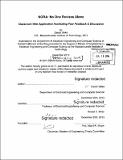| dc.contributor.advisor | Robert C. Miller. | en_US |
| dc.contributor.author | Sikka, Denzil | en_US |
| dc.contributor.other | Massachusetts Institute of Technology. Department of Electrical Engineering and Computer Science. | en_US |
| dc.date.accessioned | 2014-11-24T18:41:18Z | |
| dc.date.available | 2014-11-24T18:41:18Z | |
| dc.date.copyright | 2013 | en_US |
| dc.date.issued | 2014 | en_US |
| dc.identifier.uri | http://hdl.handle.net/1721.1/91869 | |
| dc.description | Thesis: M. Eng., Massachusetts Institute of Technology, Department of Electrical Engineering and Computer Science, February 2014. | en_US |
| dc.description | Cataloged from PDF version of thesis. "December 2013." | en_US |
| dc.description | Includes bibliographical references (pages 47-49). | en_US |
| dc.description.abstract | Peer-to-peer interactions, either through discussion forums or the peer review process, provide students with essential articulation skills as they reflect and respond to the ideas of others. Unfortunately, many students lack confidence in the value of their thoughts and feedback, or students experience difficulty maintaining interest in a peer's thoughts/ideas, which results in a lack of motivation to participate or in comments that are overly superficial, flattering, or brief. The interactive application NORA emphasizes that no one reviews alone by allowing the users to write comments and then combine, like, and rearrange them on a large canvas as they analyze a piece of work, examine a topic, or provide feedback. Thus, NORA facilitates the peer review and discussion process, addressing the challenges faced by students. NORA's visual-oriented interface novel in how it presents content to the students in smaller pieces, allows several threads of comments to be seen at the same time, and provides for easy interaction between users as they write or combine comments, guiding them through specific learning goals chosen by the instructor. Targeted at college students, the application was tested in two different classes, Rhetoric and Communication and Spanish /, with different classroom activities that are typically done orally with extensive class discussion. In both classes, students analyzed the subject matter and reviewed the medium as they responded to the comments of each other and the guidelines provided by the professor. The peer-to-peer interaction allowed users to build upon each other's comments, and promoted accurate, thorough, and relevant feedback in an engaging manner. NORA was seen to encourage more interaction, draw out quieter and shyer students, and boost the number of thoughtful, analytical responses. | en_US |
| dc.description.statementofresponsibility | by Denzil Sikka. | en_US |
| dc.format.extent | 49 pages | en_US |
| dc.language.iso | eng | en_US |
| dc.publisher | Massachusetts Institute of Technology | en_US |
| dc.rights | M.I.T. theses are protected by copyright. They may be viewed from this source for any purpose, but reproduction or distribution in any format is prohibited without written permission. See provided URL for inquiries about permission. | en_US |
| dc.rights.uri | http://dspace.mit.edu/handle/1721.1/7582 | en_US |
| dc.subject | Electrical Engineering and Computer Science. | en_US |
| dc.title | NORA : no one revises alone : classroom web application facilitating peer feedback & discussion | en_US |
| dc.title.alternative | Classroom web application facilitating peer feedback & discussion | en_US |
| dc.type | Thesis | en_US |
| dc.description.degree | M. Eng. | en_US |
| dc.contributor.department | Massachusetts Institute of Technology. Department of Electrical Engineering and Computer Science | |
| dc.identifier.oclc | 894355276 | en_US |
